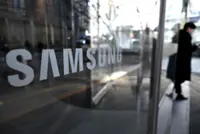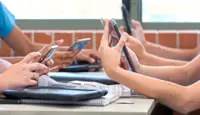Another orchestra season, another soul-killing cell phone interruption. As banal as it may be, last Saturday night's mid-Bruckner cell phone incident at the Philadelphia Orchestra is a painful thing to ponder, a kind of musicus interruptus from which a performance never really recovers.
Music director Yannick Nézet-Séguin wasn't asking for anything unreasonable when he once again suggested to the audience that maybe they could live without cell phones for an hour.
But it's not the audience's fault, not entirely. The responsibility for cell phone peace also rests with the Philadelphia Orchestra and Kimmel Center, Inc, which has invited the problem at least partially by asking audiences to more deeply engage with their cell phones during visits.
Tagging the ensemble on social media has long been encouraged. Signs at one recent performance asked patrons to bypass printed programs and instead read their program notes online. And soon it will no longer be possible for ticket buyers to print out tickets at home. As of Oct 29, Kimmel and orchestra customers can still get tickets printed by the Kimmel, but instead of showing ushers tickets printed at home, they must present etickets – on their cell phones.
POKC president and CEO Matías Tarnopolsky said he didn't think asking people to use their cell phones for some things at concerts while keeping them silent sent a mixed message.
"I don't think that's too much to ask," he said Monday, "even if you're asking them to show their tickets and read their program notes on the phone as well."
Print-at-home tickets are ending in part to reduce paper waste, a spokesperson said, and that impulse is a good one. But POKC might do more for the environment if it installed paper towel dispensers in the bathrooms that didn't require grabbing a cluster of paper towels with your wet hands just to get out one.
It's understandable that most of the phone outrage has been directed at the offending patrons (along with the usual people-are-so-rude-these-daysbile). Ours is a culture of blame. The truth, however, may be more about the unfortunate math – that out of 2,500 people at a given concert, at least one person is likely to not be in control of their technology, and all it takes is one person to ruin a performance.
Cell phone outbursts are actually happening more often than people may realise. They seem to go off only in the quietest musical sections, but in reality they're just more noticeable then. I often hear ringtones or beeping at the orchestra in louder passages, as I did on opening night.
Solutions are elusive.
"We're looking at all kinds of things," said Tarnopolsky, calling last Saturday night's incident "pretty bad." It turned out to be a case of a cell phone emitting an alarm that was difficult to turn off. He said management was looking at various ways of heading off cell phone noises. "We don't have the answer yet."
After the last cell phone misadventure in May 2023, POKC had ushers move up and down the aisles before curtain to remind patrons to silence their devices.
Listeners have suggested other solutions: instituting "market mechanisms" like fines, barring offending patrons from the hall for a period of time, blocking cell phone signals, or requiring visitors to keep cell phones in locked pouches like Yondr. All are impractical for various reasons.
But there are other possibilities.
Some halls use projected messages, and the Kimmel could use its supertitle board above the stage to blink a reminder as the orchestra tunes and again after intermission.
The live spoken word has an impact recorded words don't, and the orchestra has its best spokespeople right there on stage. The microphone could be passed around to a different musician each night to explain the importance of silence.
Could the orchestra fight fire with fire?: a cellphone app that takes care of ticketing and also emits beeps a few minutes before concert time.
What if the orchestra played a 30-second recording before each concert that started with the tranquil Adagietto from Mahler's Symphony No. 5 – only to be interrupted by a harsh electronic ringtone?
No solution is foolproof. Any reminder becomes routine after a while and people stop hearing it.
But it's time for us to do something, all of us.
One more point, something that has perhaps become lost. The public aspect of this problem has fallen to Nézet-Séguin – he's become the spokesperson for it. But there's not much more he can do. Living in the music is a collaborative pursuit. The conductor is doing his part, and so are the musicians.
It would be a civic embarrassment if all the rest of us needed to bring to the concert hall were our silence, and we couldn't even manage that. – The Philadelphia Inquirer/Tribune News Service





